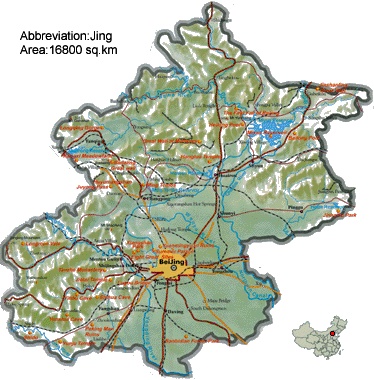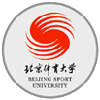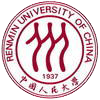Beijing Life
|
| History |
Well-know for being an ancient and cultural city, Beijing was home to the "Peking Man" about 500,000 years ago. But as a city, Beijing's history goes back to 1045 BC. For a span of nearly 1000 years, Beijing was the capital of China, or to be specific, the provisional capital of Liao (907-1125) and capital for Jin (1115-1234), Yuan (1279-1368), Ming (1368-1644) and Qing (1644-1911) dynasties.
| Geography |
Beijing is located at the northern tip of North China Plain, the city lies at approximately the same latitude as Philadelphia in the U.S. and Madrid, Spain. Mountainous along the north and west, and flat in the southeast, Beijing has a total area of 16,800 square kilometers, roughly the size of Belgium.
The city is surrounded on the west, north and east by the Yanshan Mountains. The small alluvial plain of the Yongding River lies to its southeast. Beijing faces the Bohai Sea, which is also called the Beijing Bay. The city is 39% flat land and 61% mountainous area. The highest region located in the western corner of Beijing stands at 2303 meters, while the lowest point found in the southern extremity rests at 44 meters above sea level. The city limits extend to about 80 km and consists of 18 districts and counties with a population of over 13 million people.
Beijing's land is beautified by green trees and lots of well-manicured lawns, and cultured with former imperial mansions , such as the Forbidden City, the Summer Palace and other old buildings, religious shrines and amazing old and modern structures.
| Environment |
As the cultural and political center for the country, Beijing is very safe for foreigners. There is an abundance of events always happening in the city, whether it is an important political meeting or the latest car show. Additionally, Beijing's folklore still holds forth the fascination of old-time peculiarities. A rich heritage in culture and art brought to life by burgeoning urban development has made Beijing the dream place to be for travelers from around the world.
About 95% of the Beijing people are Han Chinese, while the rest of China's 56 official ethnic minorities are scattered about the city.
| Economy |
The economy of Beijing has changed dramatically since 1949. Traditionally the city was primarily an administrative and cultural center because of its far distance from the country's key economic area, the Yangtze River valley. In the 1990s, however, the environment began to change as the private sector began to take off. Foreign investors began to understand the importance of China as a world economic power, and residents of Beijing continue to witness massive economic growth, structural expansion, and technological modernization. Entrepreneurs were quick to open bars, clubs and restaurants to accommodate the new generation of people who benefited fiscally from this expansion.
As the economy continues to boom on both the local and global levels, Beijing business is one of the hottest topics in the world. The Beijing 2008 Olympic Games have attracted both foreign and domestic travelers, giving this thriving city further exposure to the outside world. Paired with the fact that foreign trade and global economic cooperation are thriving, Beijing is one-of-a-kind business environment that offers countless opportunities.










